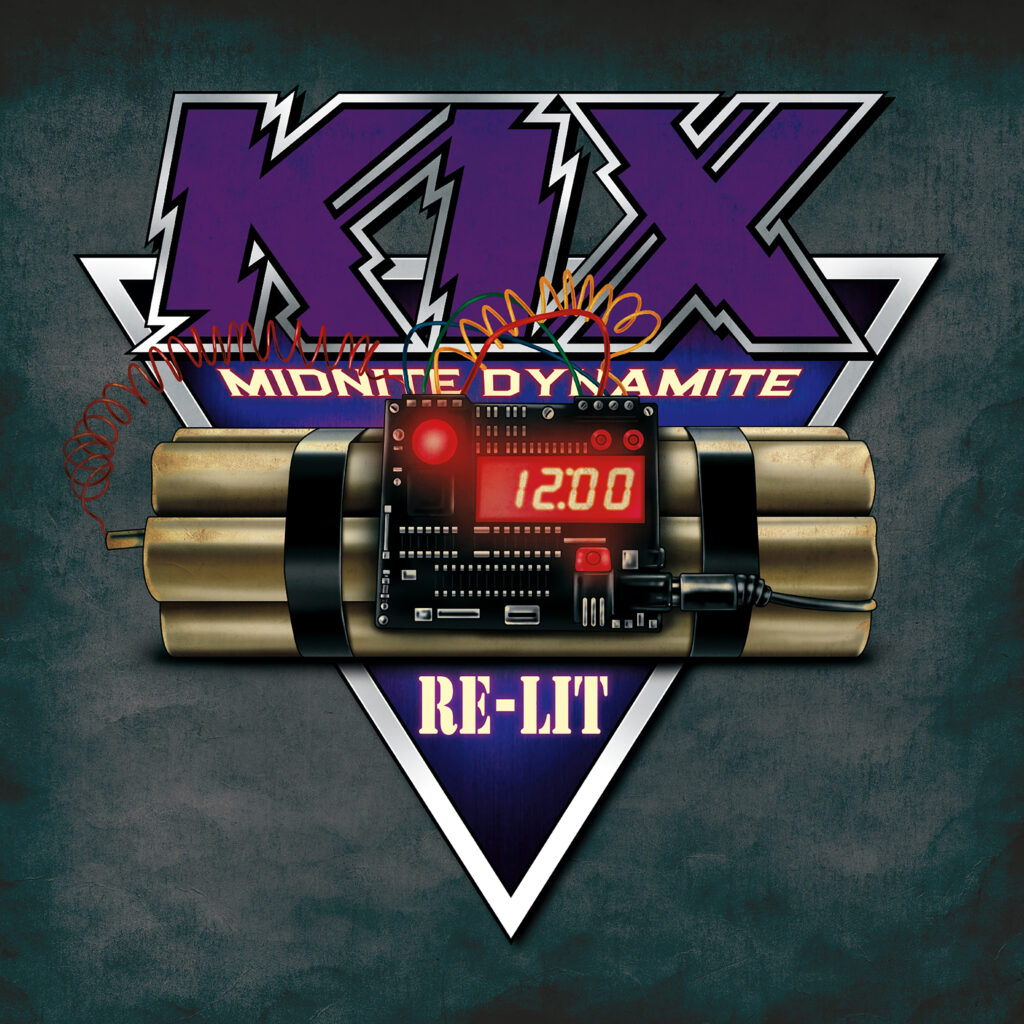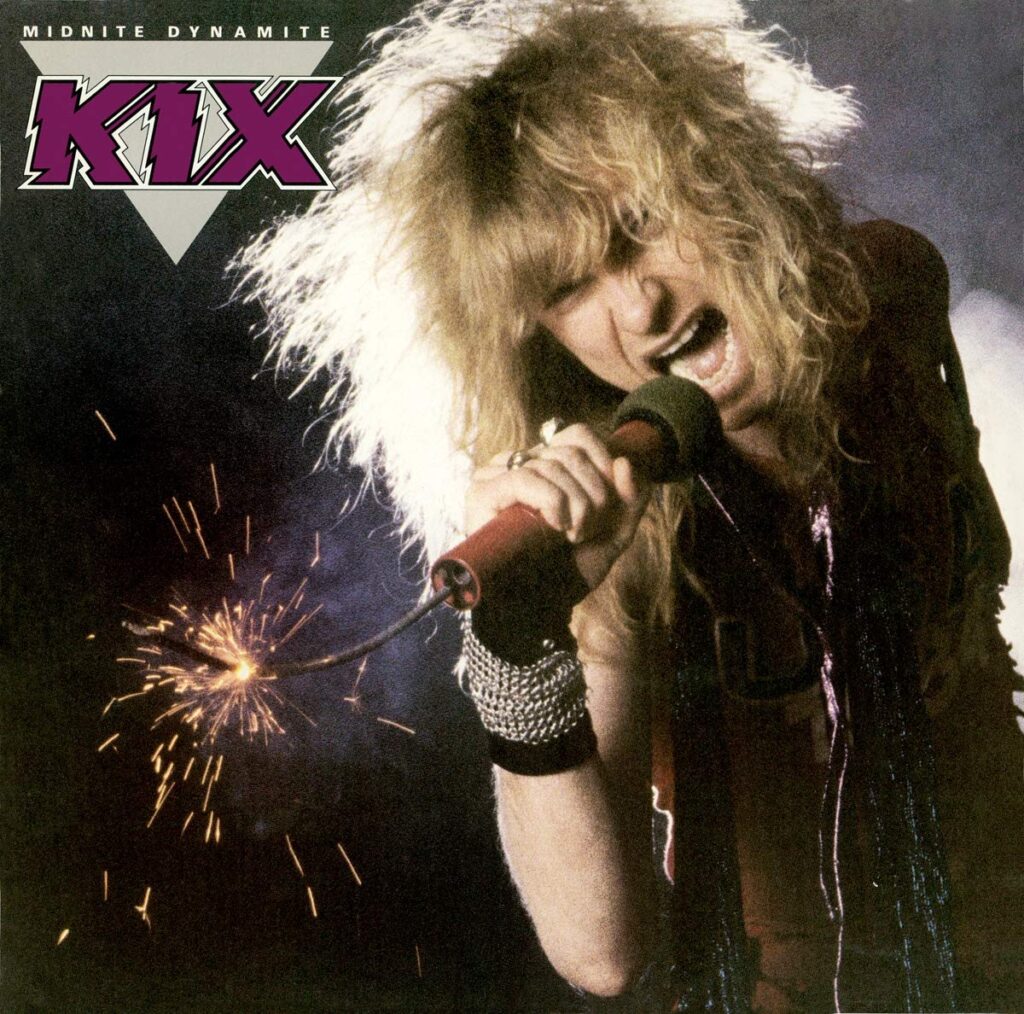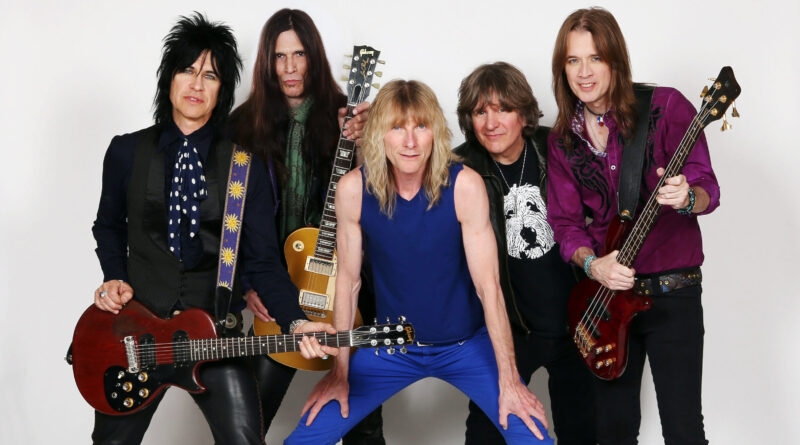Re-Lit and Ready: A Conversation With Kix Vocalist Steve Whiteman
There hasn’t been a lot to celebrate in 2020 for Kix vocalist Steve Whiteman — or anyone else for that matter. But that isn’t stopping the shaggy-maned frontman of the legendary Maryland hard rock band from doing his damndest to put a little light in our lives as the year from hell winds its way to a conclusion.
On Nov. 20, Whiteman and Kix cohorts Ronnie Younkins (guitar), Brian Forsythe (guitar), Mark Schenker (bass) and Jimmy Chalfant (drums) released “Midnite Dynamite Re-Lit” a re-mixed and re-mastered celebration of the 35th anniversary of the band’s landmark release, “Midnite Dynamite.” The band once again teamed up with the album’s original producer, Beau Hill, a major player in the Kix story who helped the band on its way to national prominence thanks to his expert production skills on the 1985 album.
Forty years later, though, Hill wanted another shot at it, much to the surprise of Whiteman.
“We were doing a show in Houston, Texas, and Beau lives in Austin, so he came out because we’re old friends,” Whiteman said in an interview with ListenIowa. “So we were sitting around in the lounge after the show, and Beau said, ‘You know, I’d really like another crack at ‘Midnite Dynamite.’ I think I could beat it.’ We thought he was joking because he did an incredible job the first time, but he was serious. It sounded muddy to him. He wanted to see if he could make it better. And he did.”
The results speak for themselves. The “Midnite Dynamite Re-Lit” tracks sound cleaner and punchier than ever, sans the extraneous echo and reverb used so prominently in the 1980s, making the sound as close to a Kix live performance as anything that’s been released by the band thus far. The album also features a bonus of eight original demo tracks from the band’s vault.
ListenIowa caught up with Whiteman to talk about the album, his turbulent working relationship with former bassist Donnie Purnell, and performing in this, the COVID era, among other things.
How have things been for you and Kix these past eight months, Steve?
It’s pretty awful, not being able to work, being on lockdown. It’s life changing. I’m at the age now where it’s like I’m practicing retirement. We’re all just hoping there’s some kind of a silver lining in this whole mess. All we can do is just wait it out.
You guys performed a drive-in show in Frederick, Maryland recently. That had to be interesting.
(Laughs) In the past seven months, we’ve played a wedding reception with social distancing and masks, a cornfield with the same thing, at some guy’s house, and a drive-in.
So you’re basically taking anything you can get.
Exactly. We’re like, “Here’s the protocol. If you can follow these safety guidelines, we’ll do it.”
When you walked out onto a stage in front of 300 cars or whatever it is, that had to be surreal. Are they honking their horns? Flashing their lights?
Luckily there were some people outside their cars so there was some interaction with the crowd. But they were so far away. It was almost like a video. You just had to remember that they were looking at you, enjoying the show, and you just try to do your damndest. It’s an impossible situation, but I thought we got through it pretty good.
Have you thought about doing a livestream event that a lot of artists are doing these days?
Yeah, that was offered to us, and I sort of shot that down. I felt that that would be really goofy. My entire show is really with the feedback and the interaction with the crowd. Just doing that into a camera, I thought I wouldn’t be able to pull that off and be comfortable doing that.
You’d rather perform out in a cornfield that do that, is what you’re saying, then.
Absolutely. I don’t want to do it in front of a camera. That’s like shooting a video, and I hated shooting videos.
In looking at the songwriting credits on “Midnite,” you have one, the last track on the album, “Sex.” The inspiration for that one is pretty self-explanatory, I’m guessing.
(Laughs) Ronnie Younkins used to live in this little, three-apartment building. He lived above me. There was always this brigade of women going in and out of his door. One night, they were going off the rails. Just going nuts. And I was thinking, “That boy has more sex than anybody I know. Just ‘Sex, sex, sex.’ ” And that kind of stuck. I wrote the lyrics, took it to the guys, and they said “Yep, that’s pretty damn funny.”
Kix has always had a great sense of humor in its music.
We were always inspired by Bon Scott and AC/DC. Bon always had humor in his lyrics. It was never, “I’m cooler than you,” or “I’m smarter than you.” It was just fun. And that was always our goal, too.
How much were you bringing to the songwriting table at that point? Donnie Purnell, your original bassist, handled much of it, but were you presenting music, too?
It was very difficult to get material on a Kix album because Donnie was a very, very good songwriter. But he also liked to control that. He wanted to pick the material. There was one point during “Midnite Dynamite” or “Blow My Fuse” where I had written about seven or eight songs and submitted them to the guys. We’d gone into the studio and made demos for them, but when it came time to send the demos up to the record company to start picking the material for the next album, he didn’t have any of my songs on the list that was sent up.
Ouch.
I got wind of that, and that pissed me off. So I took it upon myself to take my songs (to Atlantic) and go, “Look, you can love ‘em or hate ‘em, but at least hear ‘em.” He (Ronnie) caught wind that I did that and wanted to fire me. That was the kind of weird shit that we had to deal with for 18 years. It was not always a pleasant situation, and we definitely didn’t let it out of the bag, but I have no problem talking about it now. It was a hard time then, and as great as things are right now, it’s the way it should have been all the time.
Even though you two didn’t see eye-to-eye you somehow found a way to make it work, though.
Yeah, we believed in the music, we believed in the band, and knew we had a lot of fans and were on the right track. We just had to deal with craziness. It wasn’t always crazy, but when it was, it was mind-blowing crazy. I haven’t spoken to him since 1995. My last conversation with him was very unpleasant. It’s a shame that it had to be like that. Years later when we got talked into doing a local show, none of us wanted him involved. He was just a control freak. He had to be in charge of everything. It got to be overwhelming, to the point where we would never want to work like that again.
Was it Atlantic’s decision to bring in Bob Halligan, Jr. to co-write a bunch of songs on “Midnite Dynamite”? Did that stick in your craw at all?
That was more management. For the second album, they made us do some outside material that we weren’t all that hip to doing. But they were telling us that they had to get us on the radio so they were going to bring in some outside material. Our least favorite album is that second one. So when the writing for the third began, they wanted to team Donnie up with some outside songwriters so he was involved in the songwriting instead of just throwing other people’s material at us. And it wasn’t just Bob Halligan. It was John Palumbo, and others, too. The material definitely got way better.
So you had no problem with your stuff still being ignored.
Yeah, you know, I always felt like George Harrison. (Laughs)
Things were beginning to really pick up steam in hard rock and with Kix when you entered the studio to record “Midnite Dynamite.” Could you feel that momentum?
We thought we had a hit record. Having Beau Hill as a producer, and being on Atlantic Records, and having good management, we thought, “What could go wrong?” We made the best record we possibly could. We thought we had one, Beau thought we had one …. and then (Atlantic) released “Cold Shower”as the first single. It didn’t do much, and that was the end of the record as far they were concerned. We refused to let that record die, though. So we made our own video for “Midnite Dynamite” and were doing really well on the East Coast. We could play from Boston to Florida and do very well. We would hit the East Coast for awhile, pile up some money, and then go to the places that we’d never been to, like Chicago, Detroit, Cleveland, Milwaukee and Texas. Then we’d go back home, get another stockpile of money, and hit the West Coast. We pretty much did our own tour support. Through all that effort, I think that’s what set “Blow My Fuse” up to be a success.
It really makes no sense for Atlantic to pour a bunch of money into the band so they can go into the studio and record an album, only to abandon it after one single. Do you have any inkling as to what went on?
In my opinion, even though our records never made us money, they always made them money. The first album sold like 60,000-70,000 copies. Not enough to recoup any money for the band, but it made them a hell of a lot of money. Same thing with the second album. The third album (“Midnite”) sold maybe 150,000, so they were still making a hell of a lot of money. And they don’t like to give money up. So we got one video and one single. As far as they were concerned — next. And they knew there was going to be a next because of our fan base. Our fan base has always kept us alive all these years.
When “Blow My Fuse” came out and sold over a million copies, did you finally get to see some of the fruits of your labor?
Yeah, that was like a big sigh of relief. We finally got out of the van and onto a tour bus. We’re playing arenas with our peers and people that we love, getting out in front of hundreds of people, we were on MTV, went to Japan, the UK. It was a huge time in our career. Then we made the “Hot Wire” album and the whole grunge thing started to take over. It was like, “OK. There’s a new party in town, and you guys aren’t invited.” (Laughs)
That had to be a kick in the nuts after all the legwork and years of struggle you guys had put into it.
It was. Even though MTV was playing “Girl Money” and a couple of videos that were getting some airplay, the grunge thing just came in and took over.
Kix had one more album in them with “Show Business” in 1995 before breaking up. What did you do to make ends meet during those leaner years following that?
I started teaching. The only thing I really know how to do is music, so I started teaching guitar, harmonica, vocals, anything. I taught four days a week. I had some old friends visit me one day and talk me out of retirement as far as performing, and we started a band called Funny Money. Between Funny Money and teaching, I was able to sustain a decent living — not a good living — but a decent living. I brought my children up, bought our home. I was fortunate enough to have enough faith in myself, and luckily, people who knew of me wanted to work with me.
That’s where your Funny Money band came to be.
Funny Money did pretty well. That was my opportunity to write my own music and get it out to the fans. There wasn’t anybody telling me, “You can’t.” That was very liberating for me to do that band, and I loved it.
So what got Kix back up and going?
There was a local promoter who came to us with an offer. I had Jimmy on drums and Mark on bass. We were playing a lot of Kix material in Funny Money because that was the drawing card. It was half and half. When the promoter gave us this offer, we contacted Ronnie and Brian, and asked if they wanted to do it. We all jumped at it because it was kind of a lot of money that we all could use. That got the juices flowing. The show sold a shitload of tickets, and then we started to get other offers. We had our little comfort zone on the East Coast in Pennsylvania, West Virginia, Maryland and Virginia. We just played that area for several years before I got a call from a national agent named Sullivan Bigg, who’s the head of Biggtime Entertainment. He convinced me that he could get Kix playing all over the country, which I thought was nuts. I didn’t think people cared anymore. But he proved me wrong. Little by little, and year after year, we just kept getting more work and more work. Now, we’re doing better than we have in our entire lives. It’s easier now. There’s no more hopping in a van and traveling 500 miles over night. You fly in the night before, you do a show or two on the road, and you fly home. It’s more profitable, and it’s easier on the body; it’s wonderful. (Laughs)
Seeing Ronnie, Brian and Jimmy on that stage with you, after all these years, has to be a big boost, too.
Definitely. We always got along. We four were our own rock. We stayed together to keep our sanity because of the insanity that was thrust upon us by Donnie.
What’s next for you and Kix?
I’ve been writing for the last several years, and we’ve also been doing these remakes of the albums, so there hasn’t really been much talk about a new Kix album. I submitted a bunch of material for the guys to listen to, but I’m not getting much feedback from ‘em, so I’m assuming they’re not interested in doing anything right now. I’m going to take these songs that I’ve written and I’m actually in the studio right now recording a record. It will be a full-length album, and the guy who is engineering and producing it is an old friend of mine who was actually in Kix for the “Cool Kids” album, Brad Divens. We’re recording in a studio in his home, and just having a good time. We’re not putting any pressure on ourselves. Since none of us are doing anything, it’s given us something to do and we’re just having a hell of a good time.
MIDNITE DYNAMITE RE-LIT
DISC ONE: Re-mixed by Beau Hill; mastered by Jay Frigoletto
1. Midnite Dynamite
2. Red Hot (Black & Blue)
3. Bang Bang (Balls Of Fire)
4. Layin’ Rubber
5. Walkin’ Away
6. Scarlet Fever
7. Cry Baby
8. Cold Shower
9. Lie Like A Rug
10. Sex
DISC TWO: Original Demo Recordings
1. Midnite Dynamite (Demo Version)
2. Red Hot (Black & Blue Demo Version)
3. Layin’ Rubber (Demo Version)
4. Walkin’ Away (early album mix)
5. Cry Baby (Demo Version)
6. Cold Shower (Demo Version)
7. Lie Like A Rug (Demo Version)
8. Sex (Demo Version)
KIX ONLINE:


